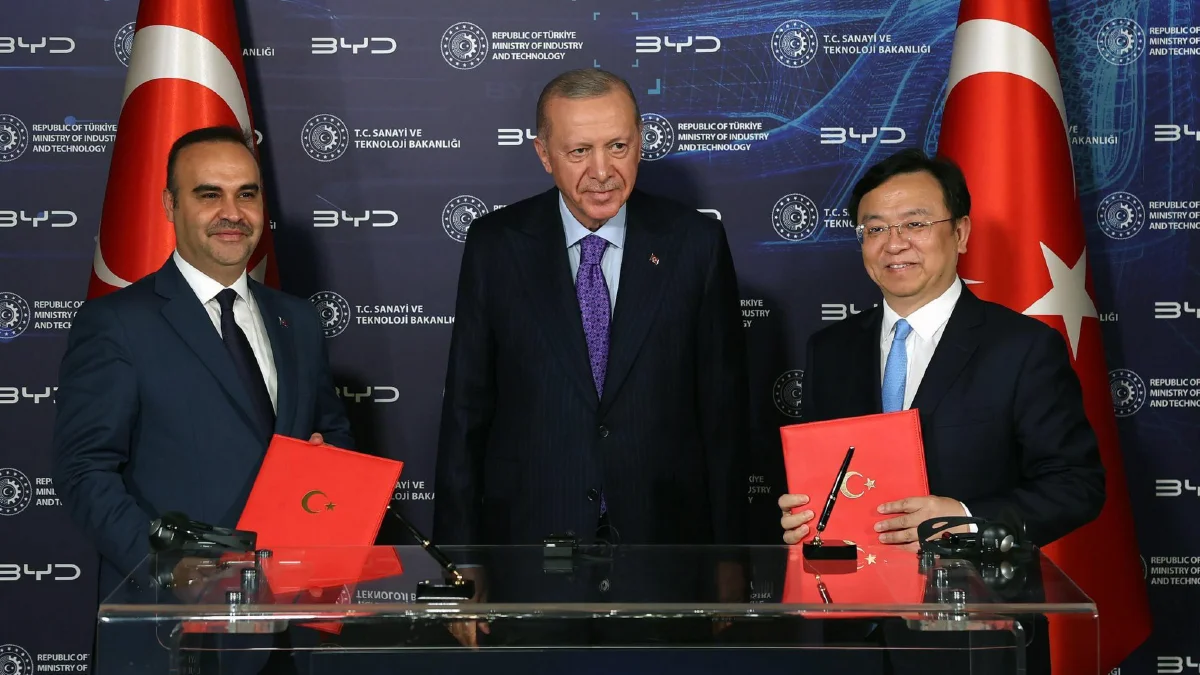Necessary Always Active
Necessary cookies are required to enable the basic features of this site, such as providing secure log-in or adjusting your consent preferences. These cookies do not store any personally identifiable data.
|
||||||
|
||||||
|
||||||
|

The largest Chinese electric vehicle maker, BYD, is set to establish a $1 billion EV manufacturing plant in Turkey. The BYD EV plant deal is part of BYD’s strategy to expand beyond China’s borders.
Backed by US investor Warren Buffet, BYD is the second largest EV manufacturer in the world after Tesla.
According to BBC, the BYD EV deal was signed at an event held in Istanbul, Turkey. BYD’s CEO, Wang Chuanfu, and Turkey’s President, Recep Tayyip Erdogan were present at the signing event.
Turkey’s Industry Minister, Mehmet Fatih Kacır said the BYD plant deal is a sign of the country’s “potential to not only be a center for international investments but also a center for innovation and advanced green technology”.
Kacır said the Turkish government was holding intensive discussions with other European and Asian vehicle manufacturers about investment. Turkey is looking to attract foreign capital to drive the country’s sweeping economic reforms.
The Turkish government says the new plant will have the capacity to manufacture 150,000 units of electric vehicles each year. Production is expected to commence by the end of 2026. The BYD EV plant is also expected to create upwards of 5000 jobs.
BYD will manufacture both hybrid and electric cars for the European market in the new plant. The Turkey EV plant deal will include a research and development center.
The BYD EV plant deal announcement comes when Chinese EV makers face increased tariffs in the US and EU. Last week, the EU raised tariffs on China-manufactured EVs to protect its motor industry.
With this raise, BYD will have to pay a 10% import duty and an extra 17.4% in tariffs on each EV it ships to the EU. Turkey is a signatory to the EU Customs Union. This means that electric cars that are manufactured in the country will be sold in the EU without the additional tariff.
The Turkish government placed a 40% tariff on Chinese vehicle imports to protect its local car manufacturers. Earlier this year, the US government announced additional tariffs on Chinese-manufactured electric vehicles, steel, and solar panels, among other goods. The tariff measures included introducing a 100% border tax on Chinese electric cars.
According to the US government, the move was intended to protect US jobs. It was also a response to unfair trade policies.
BYD has been expanding its production capacity outside China in recent years. Towards the end of 2023, the EV maker announced the establishment of a manufacturing plant in Hungary. Once completed, this will be its first factory in Europe.
Last week, the company opened its first EV manufacturing plant in Southeast Asia. The plant is located in Thailand. BYD says the plant can produce 150,000 EV units annually and generate 10,000 jobs. The company plans to set up another EV plant in Mexico.